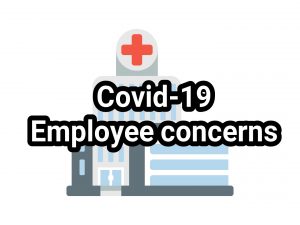As employment law attorneys, our email and social media is flooded with information from fellow employment lawyers about how employers should handle the coronavirus pandemic. Today’s Long Island employment law blog discusses some issues relating to how employees might handle the crisis. Please note, this blog is informational only and should not be relied upon as legal advice, and certainly not medical advice. The information below should be considered “food for thought.” If you have specific questions about your employment situation, we encourage you to call our lawyers, who remain available by phone throughout the crisis.
1. Listen to advice from government and medical authorities
First and foremost, pay attention to guidance given by officials from the government and from medical authorities. Leading medical authorities include the CDC and WHO, but local health departments are also issuing guidance. Best practices almost universally include washing hands, avoiding close contact with others, and proper hygiene including coughing and sneezing best practices. If you must report to work, continue to follow these instructions.
Government leaders are also providing instructions. For example, in New York, Governor Cuomo has asked employers to consider closing, and has outright ordered the closing of restaurants, bars, and movie theaters. Obviously, if you work in such industries, communicate with your employer, as well, to ensure the business is in fact closed.
2. Understand your employer’s COVID-19 policy
Agencies such as the CDC and the EEOC have been proactively issuing publications and guidance for employers to follow to establish safe and lawful policies to control the spread of coronavirus. Our previous blog discussed some of this guidance. The blog also discusses the distinction between lawful inquiries to determine whether employees have COVID-19 symptoms and whether employers’ questions about an employee’s medical conditions crosses the line to unlawful discrimination. Generally, the law will allow employers to send home employees who are showing symptoms of the virus.
We hope employers across the country will exercise leniency and err on the side of safety and allow employees to work from home, where available. Some jobs simply cannot be performed from home. If you are required to continue to report to work, but do not want to report out of concerns about the coronavirus, your refusal to report may be considered job abandonment or insubordination. Again, be sure to review your employer’s policies and speak to your HR department or supervisor. If you are in a vulnerable category, such as elderly or with an existing underlying medical condition, taking a leave of absence may be a reasonable accommodation under the disability discrimination laws. Communication with the employer is essential.
3. Understand your employer’s sick and leave policies
Hand in hand with understanding the employer’s COVID-19 policy, is understanding your company’s sick and leave policies. Employers are not required to pay employees who do not work. But, employers may allow employees to use paid sick and/or leave time if your company closes because of COVID-19. Further, we hope many employers who choose to close or who are ordered to close, voluntarily continue to pay their employees.
4. Follow updates on changes to the law
Congress is considering bills to alleviate the strain on employees caused by coronavirus. The laws may provide for extended unemployment benefits, paid leave time, and alterations to payroll tax withholdings. If you are not working because of coronavirus, you should apply for unemployment insurance benefits immediately. All employees should closely monitor the relief bills considered and, hopefully, passed by Congress. Should a bill ultimately become law, we will blog about its provisions. Follow our Facebook feed to ensure you receive timely information as the crisis develops.
5. Speak to an employment attorney
As it is medically, COVID-19 is presenting challenges legally. The situation is fluid and ever changing, thus, there is no blanket advice applicable to everyone’s situation. If you are concerned about job security, unlawful inquiries about your medical conditions, use of sick or leave time, or if you have any other questions concerning COVID-19’s impact your employment situation, contact an employment attorney. At Famighetti & Weinick PLLC, our lawyers have full access to our phones and video conferencing capabilities, from home or office. We are available to answer your questions and we continue to provide free consultations throughout the crisis. Our phone number is 631-352-0050.

Covid-19 Employee concerns
 Long Island Employment Law Blog
Long Island Employment Law Blog

